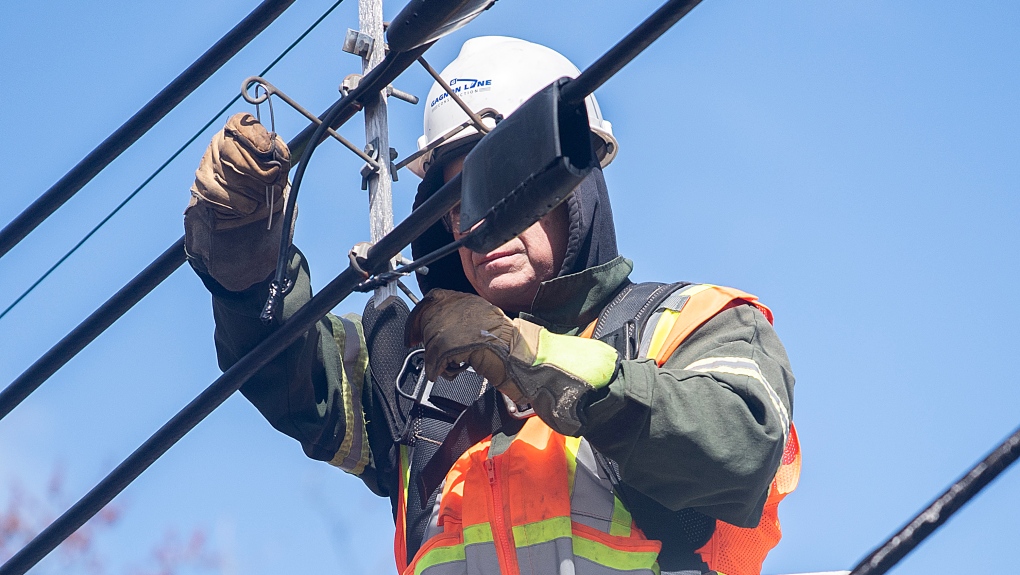Quebec and Ontario reach agreement in principle on power exchange
 A Hydro worker works on a power line following an ice storm in Montreal, Friday, April 7, 2023. Hydro-Quebec says it's restored power to more than half a million customers since Wednesday's ice storm, but more than 600,000 remain in the dark. THE CANADIAN PRESS/Graham Hughes
A Hydro worker works on a power line following an ice storm in Montreal, Friday, April 7, 2023. Hydro-Quebec says it's restored power to more than half a million customers since Wednesday's ice storm, but more than 600,000 remain in the dark. THE CANADIAN PRESS/Graham Hughes
Quebec and Ontario have signed a new memorandum of understanding on an exchange of electrical power to help each other during consumption peaks.
The previous agreement covered the 2017-2023 period and included Ontario's purchase from Hydro-Québec of the equivalent of 2 TWh per year. This portion of the power purchase is not included in the new memorandum of understanding.
Premier Doug Ford has said several times in recent years that Ontario would not buy electricity from Quebec, claiming to have an energy surplus.
Ontario Energy Minister Todd Smith said the new energy agreement was a simple exchange, with no payments on either side and that the transfer could begin as early as this winter.
The provinces' electricity operators, Hydro-Québec and the Independent Electricity System Operator (IESO), are expected to exchange up to 600 megawatts of electrical power each year, depending on peak demand, Smith said.
Ontario's energy demand increases in the summer, largely due to air conditioning on hot days, he said.
Quebec's energy needs peak in winter, mainly due to electric heating on cold days.
"The agreement simply makes sense on both sides," said Smith in an interview with The Canadian Press.
"What's also great about this system is that Quebec and Ontario have some of the cleanest grids in the world," he added.
Most of Ontario's energy comes from nuclear power, while most of Quebec's is hydroelectric.
The agreement works because Ontario's and Quebec's energy peaks occur at different times, Smith said.
The agreement would last for ten years, with revisions along the way to adjust power quantities based on usage.
Subject to the terms of the final agreement, the new arrangement could come into effect as early as the next winter season, it was reported.
"With energy demand on the rise, we need to adopt more energy efficiency and intelligence measures to better manage peak electricity consumption," said Quebec's Minister of the Economy, Innovation and Energy, Pierre Fitzgibbon, in a joint statement.
"The sharing agreement between Hydro-Québec and the IESO is a fine example of collaboration, enabling Quebec and Ontario to meet the challenges of the energy transition while decarbonizing our economies," he added.
Ontario will also be able to bank unused energy to save capacity until it's needed in future years, Smith said.
Both provinces are gearing up to meet their future energy needs, as electricity demand is expected to grow significantly over the next few years due to increased demand from industry and the rise of electric vehicles.
This report by The Canadian Press was first published in French on Aug. 30, 2023.
CTVNews.ca Top Stories

Aviation experts say Russia's air defence fire likely caused Azerbaijan plane crash as nation mourns
Aviation experts said Thursday that Russian air defence fire was likely responsible for the Azerbaijani plane crash the day before that killed 38 people and left all 29 survivors injured.
Police identify victim of Christmas Day homicide in Hintonburg, charge suspect
The Ottawa Police Service says the victim who had been killed on Christmas Day in Hintonburg has been identified.
Teen actor Hudson Meek, who appeared in 'Baby Driver,' dies after falling from moving vehicle
Hudson Meek, the 16-year-old actor who appeared in 'Baby Driver,' died last week after falling from a moving vehicle in Vestavia Hills, Alabama, according to CNN affiliate WVTM.
Pizza deliverer in Florida charged with stabbing pregnant woman at motel after tip dispute
A pizza deliverer in central Florida has been charged with pushing her way into a motel room with an accomplice and stabbing a pregnant woman after a dispute over a tip, authorities said.
Raised in Sask. after his family fled Hungary, this man spent decades spying on communists for the RCMP
As a Communist Party member in Calgary in the early 1940s, Frank Hadesbeck performed clerical work at the party office, printed leaflets and sold books.
Cat food that caused bird-flu death of Oregon pet was distributed in B.C.: officials
Pet food contaminated with bird flu – which killed a house cat in Oregon – was distributed and sold in British Columbia, according to officials south of the border.
Unwanted gift card in your stocking? Don't let it go to waste
Gift cards can be a quick and easy present for those who don't know what to buy and offer the recipient a chance to pick out something nice for themselves, but sometimes they can still miss the mark.
India alleges widespread trafficking of international students through Canada to U.S.
Indian law enforcement agencies say they are investigating alleged links between dozens of colleges in Canada and two 'entities' in Mumbai accused of illegally ferrying students across the Canada-United States border.
2 minors, 2 adults critically injured in south Calgary crash; incident was preceded by a robbery
Multiple people were rushed to hospital, including two minors, in the aftermath of a serious vehicle collision on Thursday morning.
































